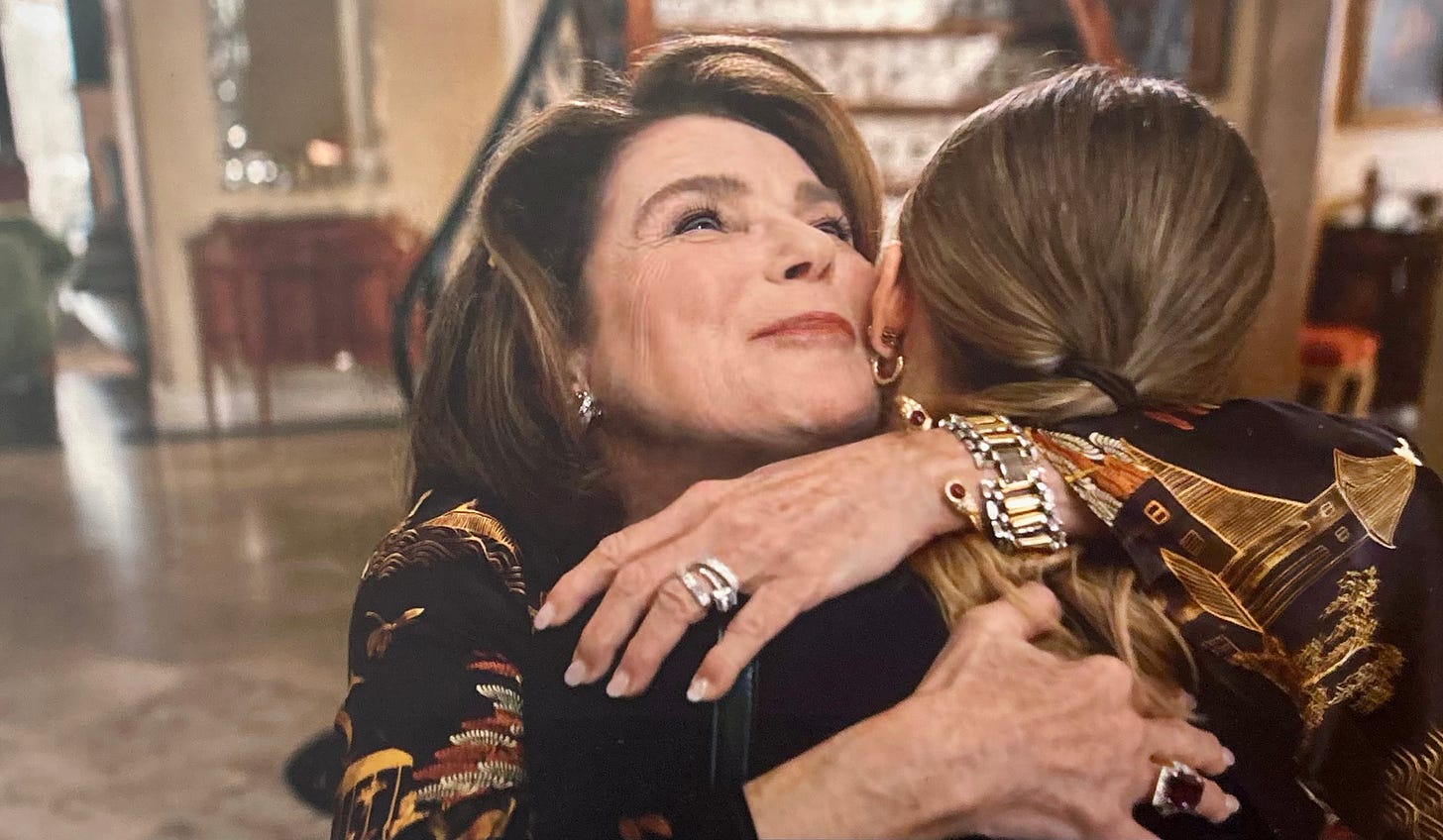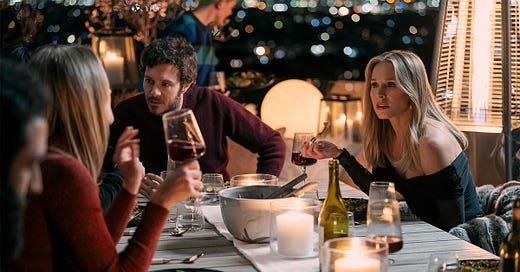‘Nobody Wanted This’ — Especially a Lot of Jewish Women
"Putting out a high-end series is a complex endeavor, but it's hard to believe no one making the show noticed how its characterization of Jewish women projected a terribly negative ethnic stereotype."
By Debbie Weiss
When I was in high school back in the early 80s, the popular girls were usually blonde, cute, and petite. They shopped at The Limited, which offered a certain suburban flair, and they got extra points for being cheerleaders. As a tall, gawky brunette, I did not measure up.
Not surprisingly, I couldn’t wait to graduate and move on to college, where I was surprised to discover people who actually appreciated my style.
But I felt like I was right back in high school when I started watching the recent Netflix series Nobody Wants This, a romantic comedy about “Noah,” a rabbi portrayed by Adam Brody, and “Joanne,” played by Kristin Bell, a gentile woman who cohosts a sex-and-relationships podcast with her sister, “Morgan.” Noah and Joanne fall in love, despite their differences and the repeated efforts of Noah’s mother, his sister-in-law, and his ex-girlfriend — all of them Jewish — to break them up.
Joanne and Morgan are both blonde, cute, sexually liberated, and a bit daffy. Many of the show’s Jewish male characters quickly become enamored of them. I could practically hear Philip Roth’s “Portnoy” moaning about his infatuation with shiksas: “How do they get so gorgeous, so healthy, so blonde?”
In contrast, the Jewish women on the show are terrible. They’re portrayed as manipulative and exclusionary, scheming to keep the two lovers apart. They also include the friends of Noah’s sister-in-law who are superficial, obsessed with their weddings, their children’s bat mitzvahs, or their tacky jewelry brands, fulfilling the worst cliches of the Jewish American Princess.
All of these women are outdated stereotypes, and I’m not the only one who felt this way. The media is full of articles about how the show fostered these tropes.
As Esther Zuckerman wrote in Time: “While it offers up the fantasy of the ideal Jewish man in Noah, the series seems to loathe Jewish women, who are portrayed as nags, harpies, and the ultimate villains of this story. I wanted to be swept away by a rom-com. Instead, I was faced with the reality that maybe this show actually hates me.” (Emphasis added).
Jessica Grose wrote in The New York Times: “I found the experience of watching the new Netflix series “Nobody Wants This” — which was originally titled “Shiksa” — to be off-putting and bizarre. The show seems to have been beamed in from the past century in both its depiction of Jew-gentile relations and its gender politics.”
“I can’t imagine any guy who watches this show who would then say, ‘I really want to date a Jewish girl!’” wrote Jessica Radloff in Glamour. “We come off as controlling, marriage-hungry women who want to plan dinner parties and alienate anyone who doesn’t share those same dreams.”
Joanne and Morgan are single and sexually adventurous, which they talk about on their podcast. In contrast, Noah’s ex-girlfriend can’t wait to be married, going so far as to assume they’re engaged even though he’s never proposed.
The other Jewish women, including his mother and sister-in-law, are overwrought in their efforts to keep the couple apart, with their schemes and cruelty towards fluffy blonde Joanna. Of course, the audience wants to see them taken down a peg by losing out to Joanna, confirming the suggestion that they’re all mean and exclusionary.

The show’s creator, Erin Foster, a real-life podcaster who converted to Judaism to marry a Jewish man, has said she wasn’t trying to perpetuate stereotypes, but rather wanted to show positive aspects of Jewish life.
That may be, but putting out a high-end mini-series with established stars is a complex endeavor involving many people. It’s hard to believe that none of them noticed that the show’s characterization of Jewish women perpetuated a negative ethnic stereotype.
How did everyone involved fail to see this? Especially when it was blatantly obvious to virtually every Jewish woman who reviewed the show.
It troubles me to think that this narrow view of Jewish women is so entrenched in the media that no one thought it might be troubling. If women of any other ethnicity were so stereotyped, I think someone involved would have noticed and changed the script.
I really wanted to like this show. A cool, menschy rabbi who finds love outside his faith, with a story told through clever writing, appealing actors — including Tovah Feldshuh as a Jewish mother — what’s not to like? But this past year and a half, we have seen the breadth of antisemitism in this country. And to have a mainstream series which offers up these characters as mindless comedy is deeply troubling.
I was uncomfortable seeing everyone like me portrayed as scheming, intolerant villains, and not even interesting ones. Just a bunch of narrow-minded manipulative biddies trying to thwart true love and keep their families free of gentiles.
Portraying the main Jewish characters as being against relationships with non-Jews was particularly troubling. It created a sense of antagonism and suggested these misguided women could be saved if only they could accept a beguiling, young gentile into their midst. A gentile who also happens to be far more appealing than they are.
It was hard spending my high school years feeling unattractive and socially unacceptable. Sometimes it felt like the popular girls were just better at everything than I was; cuter, more put together, more likable, and in the case of the cheerleaders, definitely better coordinated. Though back then my feelings had more to do with being socially awkward and insecure than being Jewish.
But I didn’t expect to feel that way watching a mainstream TV show. And I can’t help but think that whoever put that out really dislikes people like me.
I didn’t want this, and moreover, the ones who created this mainstream entertainment should have known better.
DEBBIE WEISS is a former lawyer, essayist, and the author of Available As Is: A Midlife Widow's Search for Love.
From unpacking history and politics to navigating the nuances of family and personal relationships to finding the human angle on sports and entertainment — plus our unsparing take on what’s happening in the Jewish world — the canvas at JEWDICIOUS is limitless! JOIN US!!






I share your opinion.
Hollywood denigrating Jewish women is not new. The entire cultural phenomena surrounding Jewish women with the negative stereotype of the JAP came from Jewish men in Hollywood. Now that it is ok or even de rigeur to be anti-Jewish, especially in the progressive legions of the film industry, why would they think that denigrating Jewish women was a bad thing? Promoting antisemitic stereotypes is Hollywood's go to especially for Jewish women.